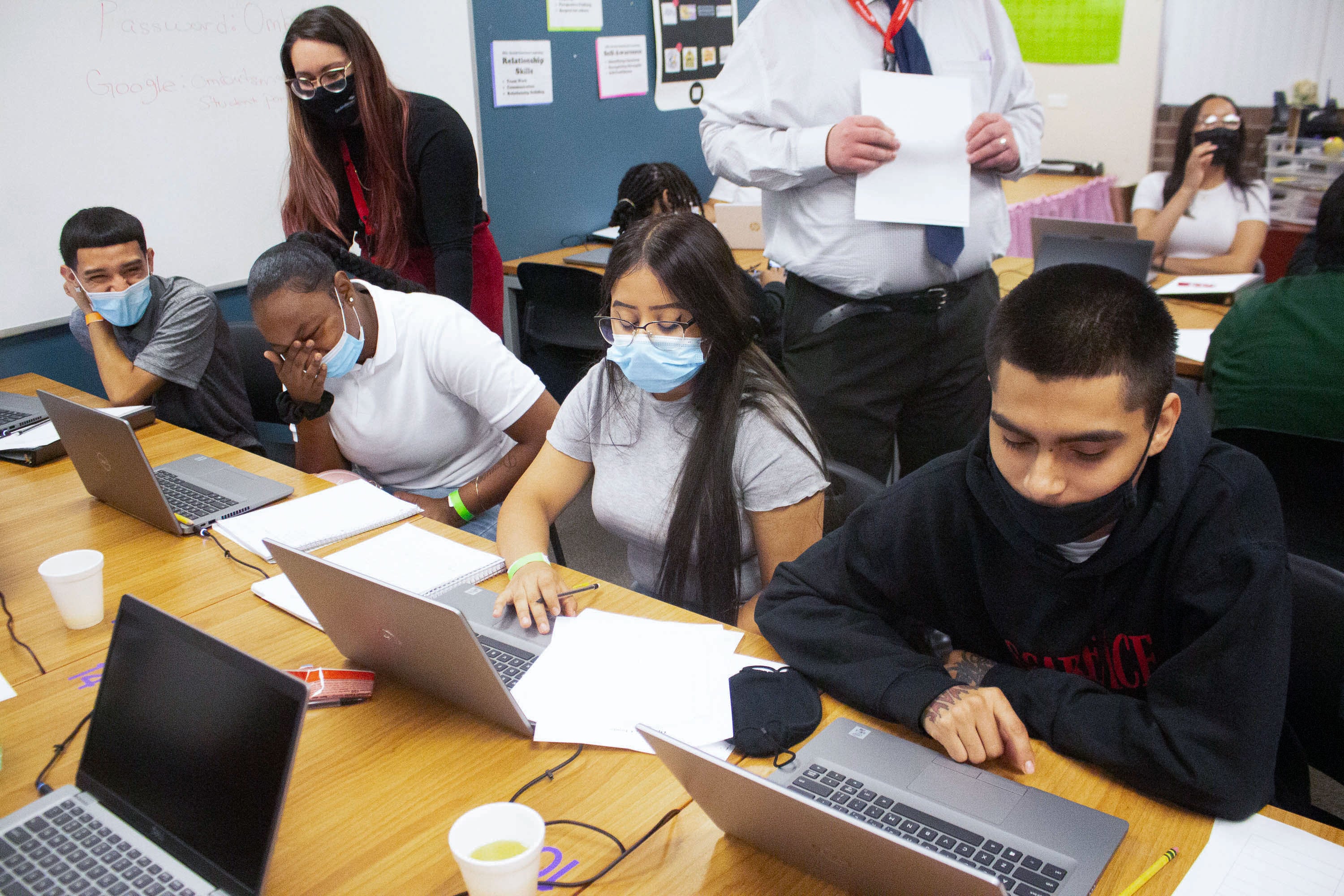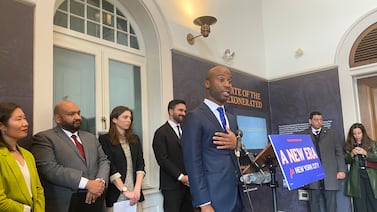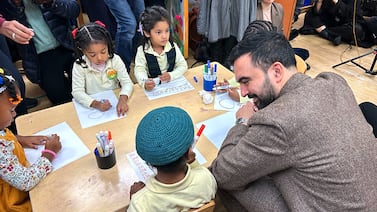Some Chicago school board members are urging the district to pick up the pace on its federally-funded push to address the pandemic’s academic and mental health fallout, saying the money isn’t being spent fast enough to meet the immediate needs of students.
The district has so far spent only 12%, or $62.9 million, on a two-year, half-billion dollar initiative called Moving Forward Together, which was designed to help students bounce back from COVID disruption. And it has made use of less than 7% of its $1.8 billion allocation under the Biden administration’s American Rescue Plan, the third and final round of federal COVID relief dollars.
District officials said they have run into a slew of hurdles to spending the money faster: The delta and omicron variants diverted energy from academic recovery efforts, and the national “Great Resignation” made it harder to line up the staffing needed to roll out new programs to support students.
CEO Pedro Martinez also noted that the district had to spend dollars from earlier federal relief funding rounds first, and that not all expenses are included in the American Rescue Plan figures because the district hasn’t reported them to the state.
Some school members said they understand the challenges, but still would like to see stepped-up efforts to get help to schools now.
Board president Miguel del Valle said the district needs to expedite its hiring processes for community-based organizations that provide CPS with social, emotional, and mental health support.
“This is an emergency,” del Valle said. “Schools are crying out for additional help.”
Board member Luisiana Melendez acknowledged the persistent challenges, but said “timely interventions” for students were immediately needed to prevent more problems in child’s learning, and social and emotional development.
“I am a little discouraged by the low amount of investment so far,” she said.
The Moving Forward Together plan announced last June uses $525 million — a portion of the $1.8 billion in American Rescue Plan dollars the district received — to address academic and mental health trauma from the pandemic over the span of two years. Chicago Public Schools got a total of roughly $2.8 billion from three rounds of federal COVID relief.
The program investments include:
- learning acceleration and access to grade-level content ($35 million)
- targeted intervention and tutoring ($15.3 million)
- supporting students with disabilities and English language learners ($7.6 million)
- early literacy ($1.9 million)
- transition-year support ($11.1 million)
- social, emotional, and healing supports ($3 million)
Real-time spending data that Chalkbeat obtained and analyzed suggests that the district has so far used a significant portion of its federal COVID relief dollars to cover the salaries and benefits of existing teachers and support staff and other routine expenses for which it had previously budgeted state and other funds. The district told the state it would use about $764 million in federal emergency relief to pay for existing instructional positions alone. It plans to separately cover support staff such as cafeteria workers and security guards as well as pre-kindergarten personnel with COVID dollars.
During a meeting at the beginning of the school year, board members pressed district officials to spell out how they would track whether the initiative was paying off for students. Some members voiced concern about the possibility of making a substantial investment without having results to show for it.
At the time, officials said they were still exploring ways to capture the program’s outcomes, noting some challenges such as quantifying student mental health improvements. But they promised to report back with concrete measures of success.
On Wednesday, district officials didn’t outline a metric for measuring the success of the program. Rather, board members echoed Melendez’s concerns around the pace of spending for such interventions.
The school year had been dubbed as a “recovery year,” but in reality the district has been focused on reopening and keeping schools open amid surges, staffing retention, and other issues, Martinez said.
“We all wanted this to be a recovery year, but it has not played out that way,” Martinez said.
Across the country, school districts are grappling with learning gaps and mental health challenges created by the pandemic that upended the education system. The federal government has issued billions in COVID relief funding to help school districts respond.
In detailing the initiative last summer, Chicago Public School officials said about 84,500 students had been flagged for target support and another 18,130 students would qualify for more intensive outreach. The district’s effort would primarily be focused on the South and West communities hardest hit by the coronavirus pandemic, officials said at the time.
The initiative is broadly focused on re-engaging students who tuned out after the district shifted from in-person to remote learning in March 2020. Chicago Public Schools used portions of the funds to create behavior and mental health teams at school, while also partnering with outside providers for mental health services.
At Wednesday’s meeting, Melendez and other board members asked the district how they planned to speed up the use of these funds to ensure students were receiving necessary interventions now and in the coming years.
“This is not meant to be finger-pointing or blaming anybody,” Melendez said, “but I think this is an issue that is becoming increasingly urgent as time continues to go by and children are suffering from the long-term learning impacts — and social emotional impacts— of COVID.”
The presentation was only “a partial picture,” in part, because of the complexity around how those funds are reported, Martinez said, promising a more in-depth analysis of spending by May. Still, Martinez said the district was “doubling down” on providing support that principals were asking for including social workers, counselors, and nurses by next year.
Board member Melendez acknowledged the complexity of the funding but argued that “schools are hurting, they need support now.”
Mila Koumpilova is Chalkbeat Chicago’s senior reporter covering Chicago Public Schools. Contact Mila at mkoumpilova@chalkbeat.org.
Mauricio Peña is a reporter for Chalkbeat Chicago, covering K-12 schools. Contact Mauricio at mpena@chalkbeat.org.






